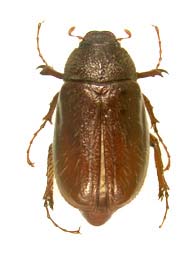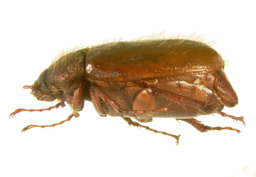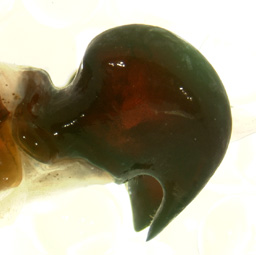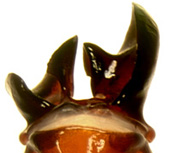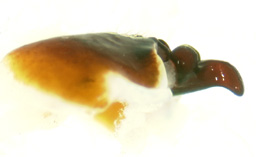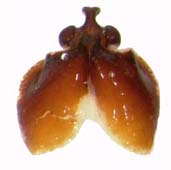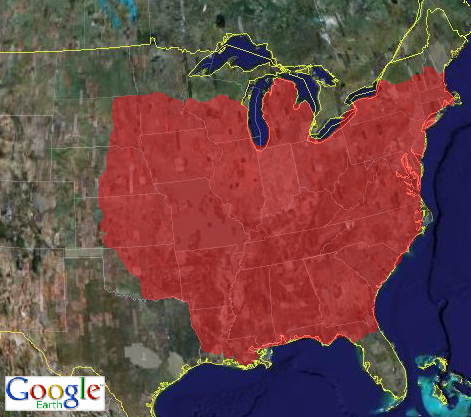 |
|||||||
|
|||||||
|
||
| Melolonthinae Tribes | ||
|
||
|
||
| Melolonthinae Taxa Map | ||
| Phyllophaga catalog | ||
| Phyllophaga gallery | ||
| Phyllophaga genitalia gallery |
.......Phyllophaga hirticula (Knoch, 1801)
.
Phyllophaga hirticula
Photos by: Maxi Polihronakis
.
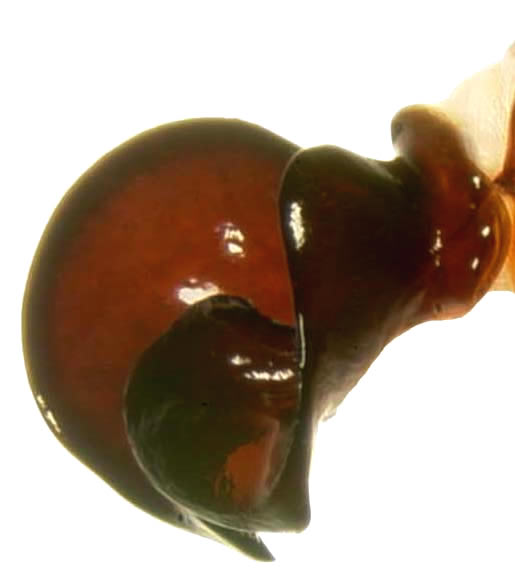
Left Lateral View
Photos by: Maxi Polihronakis.
.
Phyllophaga hirticula female genitalia.
Photos by: Maxi Polihronakis.
. .
Phyllophaga hirticula distribution
Distribution: Eastern United States: Alabama, Arkansas, Connecticut, Delaware, Florida, Georgia, Illinois, Indiana, Iowa, Kansas, Kentucky, Louisiana, Massachusetts, Maryland, Michigan, Missouri, Mississippi, North Carolina, Nebraska, New York, Ohio, Oklahoma, Pennsylvania, Rhode Island, South Carolina, South Dakota, Tennessee, Virginia, West Virginia, Wisconsin.
Remarks: Unlike most Phyllophaga species, P. hirticula is easily identified by the evenly spaced rows of elytral setae. However, variation in some specimens of P. hirticula with no elytral setae have been collected in Kansas and Nebraska.
Biological data: Phyllophaga hirticula has a three-year life cycle in northern states, and a potentially truncated two-year life cycle in southern states. Brood emergence can be periodic with inconsistent numbers from year to year. Pest status of P. hirticula is primarily concentrated to the bluegrass region of Kentucky.
Temporal distribution: Adult emergence begins as early as March and April in southern states. In northern states, adult emergence typically takes place in May and June.
Original Description:
Knoch, A. W. 1801. Neue Beyträge zur Insectenkunde. Theil 1. Schwickertschen Verlage, Leipzig. 208 pp.Glasgow (1916) designated P.hirticula as the type species of Phyllophaga by subsequent designation.
References:
Böving, A. G. 1942. A classification of larvae and adults of the genus Phyllophaga (Coleoptera: Scarabaeidae). Memoirs of the Entomological Society of Washington 2:1-95.Glasgow, R. D. 1916. Phyllophaga Harris (Lachnosterna Hope): A revision of synonymy, and one new name. Bulletin of the Illinois State Laboratory of Natural History 11:365-379.
Horn, G. H. 1887. Revision of the species of Lachnosterna of America North of Mexico. Transactions of the American Entomological Society 19:209-297.
Luginbill, P., and H. R. Painter. 1953. May beetles of the United States and Canada. United States Department of Agriculture Technical Bulletin 1060:1-102.
Smith, J. B. 1888. Notes on the species of Lachnosterna of temperate North America, with descriptions of new species. Proceedings of the United States National Museum 11:481-525.
Woodruff, R.E. and B. M. Beck. 1989. The scarab beetles of Florida (Coleoptera: Scarabaeidae) Part II. The May or June beetles (genus Phyllophaga). Florida Department of Agriculture and Consumer Services, Gainesville, FL.
| .... Entomology Home | Research | UNSM Entomology Database | Scarab Workers |
Author: Maxi
Polihronakis
Work supported
by NSF DEB #0608349 to MP at UConn
Generated on: 22/FEB/2007
University of Nebraska State Museum - Division of Entomology
